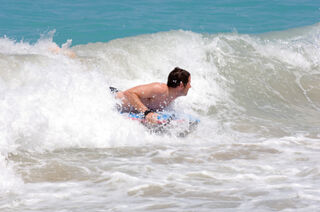Anxiety
R.I.D.E. the Wave of Panic
You don't have to be afraid of anxiety and panic.
Posted October 5, 2011 Reviewed by Matt Huston

Have you ever ridden a boogie board or bodyboard in the ocean? A boogie board is very much like a surfboard, only smaller. You lie with your stomach on the board, paddle out from shore, catch a wave, and ride the wave back into the shore.
I'd like you to imagine the wave as being an anxiety or panic attack. Sometimes the wave will be a slight crest and sometimes it will be larger. Sometimes you'll catch it pretty close to shore, and sometimes you'll catch it further out, making the ride last longer. Now imagine yourself on that boogie board gently riding the waves. Feel the exhilaration and adrenaline rush that come with each rise and fall of the wave. You don't know how high each wave will be until you're on it, you're not quite sure how long the ride will take, but what you do know is that if you allow the wave to carry you, it will always take you back to the shore, the solid ground.
This analogy is the strategy I developed for my patients to help them manage panic and anxiety attacks. I ask them to imagine themselves on that boogie board and to R.I.D.E. the wave of panic back into the shore where the panic will subside.
R.I.D.E. stands for:
Recognize
Involve
Distract
End
I will discuss this in more detail below. First I'd like to talk about panic.
What is a panic or anxiety attack? (I will use them interchangeably.)
A panic attack is when you have sudden and intense fear. Sometimes you'll know what has triggered the fear, i.e., an impending speech you have to give, getting lost in the woods, etc., but sometimes it will seem to come out of nowhere. Some people feel like they may be having a heart attack, are going to die, unable to breathe, going "crazy," are out of control, or as if the fear will never go away.
Symptoms of a panic attack may include:
• Feeling as if your heart is beating out of your chest
• Breathing very shallowly and quickly
• Chest pain
• Light-headed
• Dizziness
• Fear of being out of control
• Chills or feeling sweaty
• Trembling
• Trouble swallowing
Panic attacks trigger a surge of adrenaline in our bodies. Adrenaline is a hormone that is released by the adrenal gland. Not only is it released during a panic attack, but it is also released when we're stressed, when we're involved in doing something physical, when we're excited and when we're angry. It is perfectly normal to have this adrenaline "surge," perfectly natural, and perfectly safe. In fact, in times of danger, it's the adrenaline surge that can help us with the "fight/flight" response.
It's important to know and to remember that panic attacks are not dangerous, they just feel that way and so can be extremely frightening. They will not cause you to do anything you don't want to do, will not cause you to "go crazy," will not make you stop breathing, will not kill you and will always go away. This is an important point, so I'll repeat it: They always go away.
An anxiety attack can last from a minute or two to 10 minutes, even a bit longer. It depends on how we react to it. In my last article, "To Fear or Not to Fear, You're in Control," I talked about how our interpretation of why we're feeling anxious affects our response to anxiety. If you're feeling panicky because you're lost in the woods and tell yourself that it's normal to feel panicky because you're lost, chances are, the panic will subside in a minute or two. If however, you worry that the panic will last until you get out of the woods, will prevent you from finding your way out, will cause you physical harm for which you won't be able to get help because you're lost in the woods, which will cause you to faint or even die, the feelings of panic will most likely increase and last much longer.
Above, I talked about the strategy I developed to help you in dealing with panic attacks: R.I.D.E. the wave of panic.
When having a panic attack, here is what I'd like you to try:
1) Recognize and accept that you're feeling anxious.
2) Once you're feeling anxious, immediately Involve yourself in your surroundings. Look around, pay attention to what's going on around you. Notice who's there, what people are saying, what the environment looks like.
3) Then I'd like you to Distract yourself. Talk to someone and really pay attention to the conversation, sing a song, read a magazine, or watch television. Try to become active in what you do, in other words, if you read a magazine, say the words aloud to yourself. The goal is to focus on something other than the panicky feelings you're experiencing.
4) When you are able to distract yourself away from your feelings, the panic will End by itself, without a struggle.
These steps are something you are going to have to practice, get used to and comfortable with. Please be patient with yourself. The technique probably will not come easily to you and will take some time to learn. If you have a long history of having panic attacks and have them frequently, you may want to consult with a mental health professional as you try this new approach.
Let's go back to the boogie board analogy. What do you think happens if you fight the wave, if you don't let it carry you? Well, you might fall off the board and have to climb back on it again, you might get stuck in the water and be there for a longer period of time, or you might tense up and experience a bumpier ride. Chances are, if you recognize you're on this ride and let the wave carry you, the ride will be shorter, smoother, and less frightening.
The best thing you can do for a panic attack is to R.I.D.E. the wave of panic into shore where it will end. Some people believe they have a better solution. Some of them will tell you to "calm yourself down." In theory, that sounds OK, but if you tell yourself to calm down during an attack, you are likely to worry and perhaps panic that you're unable to calm down, thus making the "ride" longer and bumpier. Other people might tell you to just breathe slower and more deeply. That also sounds plausible. However, if you tell yourself to breathe deeply and slowly you are likely to pay attention to your every breath, which will undoubtedly cause you to breathe faster and more shallowly. (You probably know what happens if someone tells you not to think of the word ‘elephant').
You don't have to try to make the panic attack end; it will end by itself when you stop fighting it. You can gain control of your panic attacks by trying not to control them. I know that sounds contradictory, but it works. Once you accept that you have them, and trust that you don't have to fight them, you can use my R.I.D.E. method to get through them until they end. As you get more comfortable with this method you may find your panic attacks to be shorter in duration and less frequent.
Best of luck to you.




